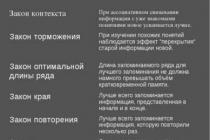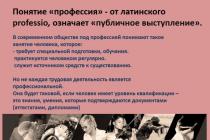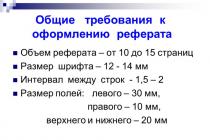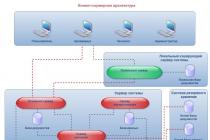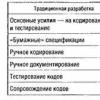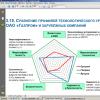Explanatory note
to the draft bill amending the
Federal Law of December 28, 2013 N 442-FZ
« On the basics of social services for citizens
In Russian federation"
(Edition dated 20.10.2014)
Federal Law No. 442-FZ of December 28, 2013 “On the Fundamentals of Social Services for Citizens in the Russian Federation”, in accordance with its Article 37, comes into force on January 1, 2015.
As it is clear from the explanatory notes and comments to it, the provisions of the Federal Law “On the Fundamentals of Social Services for Citizens in the Russian Federation” systematize and regulate the practice of organizing social services for the population that has actually developed in the constituent entities of the Russian Federation.
At the same time, Federal Law No. 442 introduces unconstitutional norms that infringe on the inviolability of private life, the inviolability of the home (part 1 of article 23 of the Constitution of the Russian Federation, parts 1, 2 of article 137 of the Criminal Code of the Russian Federation), allowing arbitrary interference in family affairs (art. 1 of the Family Code of the Russian Federation), and, in addition, beyond the scope of the subject of legal regulation of this Law, stated in its articles 1-3.
1. Article 3 « Basic concepts used in this Federal Law”, the concept of prevention is given:
"6) prevention of circumstances that cause the need for social services - a system of measures aimed at identifying and eliminating the causes that served as the basis for the deterioration of the living conditions of citizens, reducing their ability to independently provide for their basic life needs."
Article 29 of the Federal Law No. 442 establishes that the prevention of circumstances that determine the need for a citizen in social services, including carried out by " surveysconditionslife-sustaining citizen, determining the causes,affecting the deterioration of these conditions".
The law does not specify that the relevant authorities should start preventive measures after a citizen applies for any assistance to the social service authorities. Consequently, the bodies of interdepartmental interaction, in accordance with the adopted law, will have the right to enter dwellings, conduct an “examination”, “identify the causes” even before the onset of circumstances giving the right to social services, which can be regarded in no other way than "collection, storage, use and dissemination of information about the private life of a person without his consent", and this is expressly prohibited by Part 1 of Article 24 of the Constitution of the Russian Federation.
The validity of this fear is confirmed by the statement of Nelly Strutinskaya, Commissioner for Children's Rights in the Komi Republic : “I believe that any family (not only social risk) should be under the close attention of the relevant authorities in order to provide timely assistance ( http://www.kzsrk.ru/news/3901/).
Meanwhile, article 15 « Recognition of a citizen in need of social services "there is not a single specific circumstance that could be prevent by means of the measure specified in subparagraph 1, paragraph one of Article 29. It is impossible to prevent old age, disability, illness, loneliness, orphanhood, low income, unemployment, lack of a certain place of residence, neglect, conflicts, abuse, difficulties in social adaptation.
To prevent these circumstances specified in the law, which are the basis for the provision of social services to a citizen, a set of measures is needed in the field of economics, culture, education, medicine, safety and others. However, in the conclusion of the Government of the Russian Federation it is said that this law does not require additional funding, which means that funding "for prevention" under the new law is not included.
The danger of the proposed norm is obvious: under a plausible pretext, total control over citizens is introduced, with the aim of greater coverage of the population with social services, and, consequently, obtaining more funding for organizations providing these services. One can see not so much the state's concern for the recipients of social services as for the providers of social services.
The bill proposes to exclude subparagraph 1 of paragraph 1 of Article 29 from Federal Law No. 442.
2. Subparagraph 5 of paragraph one of Article 15 “Recognition of a citizen in need of social services” will also contribute to total control over the population, which, as a circumstance worsening or capable of worsening the living conditions of a citizen, entailing the need for social services, indicates
“5) the presence of an intra-family conflict, including with persons with drug or alcohol addiction, persons addicted to gambling, persons suffering from mental disorders, the presence of domestic violence.”
But " hthrough overcoming variousconflicts in family interaction, both spouses and children develop the ability to overcome life's difficulties, as well as the ability to take responsibility for their behavior in the family and in society. There are no conflict-free families, becauseconflicts inevitably arise in the dynamics of marital and parent-child relationships. Without them, the development of the individual and the family as a whole is impossible. Family well-being does not depend on the absenceconflicts but from developing the ability to overcome them and cope with them in all family members. It should be concluded that there are conflicts with any family. Conflicts can both exacerbate crises and resolve them, but social services should not interfere in them, because. no measures of social workers can reduce the conflict in the family, and intervention from the outside can only increase it"(from the conclusion of an expert psychologist, Candidate of Psychological Sciences Kunitsa M.Yu.).
By themselves, “conflicts” in the family, even with antisocial persons, cannot be the object of attention of anyone other than the parties to the conflict. And drug and alcohol addiction, gambling addiction, mental illness cannot be eliminated by social service measures regulated in Federal Law 442, patients need treatment. In addition, medical diagnoses of diseases that citizens suffer from are a medical secret (Article 13 of the Law of November 21, 2011 No. 323-FZ “On the Basics of Protecting the Health of Citizens in the Russian Federation”), protected by laws, including Article 137 of the Criminal Code of the Russian Federation (violation of privacy), Article 10 of the Federal Law of July 27, 2006 No. 152-FZ "On Personal Data". Dissemination of information about diseases by family members without the consent of the patient in the absence of any threat to the life and health of others may also be punishable by law. At the same time, neither the patient himself nor his family members are deprived of the opportunity, if necessary, to seek medical help from the appropriate organizations.
The concept of violence is not deciphered in the article, which carries the risk of a broad interpretation of the law and violation of the rights of citizens. Meanwhile,
« in the psychological, pedagogical, forensic literature, there are several classifications of various types of violence.
Psychological violence in the family is any requirement or rule that is fulfilled without desire, as well as everything that leads to coercion and submission - the forced execution of the will of another person. In the family, in marital and parent-child relationships, situations inevitably arise that require the implementation of family and social norms, rules and agreements, which are often carried out without desire, forcedly or through concessions and compromises.
In each family, depending on the cultural, spiritual traditions, family rules introduced by the spouses from parental relations into their family, one of them takes on the role of the head of the family and establishes new rules by which the married couple lives, are brought up
children. The upbringing of children is built on demands, concessions, compromises, rewards and punishments and is based on the formation of responsibility for all family members through overcoming marital and child-parent conflicts and subordination to family authorities (father and mother) "(from the same expert opinion) .
Thus, psychological violence should be excluded from the scope of Federal Law No. 442, as carrying a potential threat to interference in family relations by the bodies of interdepartmental interaction.
Since physical or sexual violence in the family may be circumstances requiring social services, such as providing shelter to mother and child, subparagraph 5 of paragraph one of Article 15 should be reworded, leaving them among the circumstances that worsen or may worsen the living conditions of a citizen.
3. As unnecessary and unjustified, contrary to the second paragraph of Article 3, infinitely expanding the scope of interference in the personal space of a citizen, subparagraph 8 of paragraph one of Article 15 is subject to exclusion, since not every deterioration in the living conditions of a citizen (for example, a decrease in wages, a decrease in living space, etc.) is directly related to the inability to independently provide for their basic life needs and requires the provision of social services.
The implementation from January 1, 2015 of these norms, which allow intruding into a home and collecting information about private life without the consent and application of a citizen, or without a court decision, for “prevention purposes”, will entail a massive violation of the rights of citizens. Whereas Article 55 The Constitution of the Russian Federation provides.
2) persons who have suffered as a result of emergency situations, armed interethnic (interethnic) conflicts.
2. Social services in the form of social services at home and in the semi-stationary form of social services are provided free of charge if, as of the date of application, the average per capita income of the recipient of social services, calculated in accordance with the regulatory legal acts of the Russian Federation, is below the limit value or equal to the limit value of the average per capita income for providing social services free of charge, established by the law of the subject of the Russian Federation.
3. Regulatory legal acts of the subjects of the Russian Federation may provide for other categories of citizens to whom social services are provided free of charge.
4. The procedure for determining the average per capita income for the provision of social services free of charge for the purposes of this Federal Law is established by the Government of the Russian Federation.
5. The size of the maximum per capita income for the provision of social services is established free of charge by the laws of the constituent entity of the Russian Federation and cannot be lower than one and a half of the subsistence minimum established in the constituent entity of the Russian Federation for the main socio-demographic groups of the population.
Judicial practice under article 31 of the Federal Law of December 28, 2013 No. 442-FZ
Decree No. 44G-80/2018 4G-1059/2018 dated October 24, 2018 in case No. 44G-80/2018
Decree No. 44G-79/2018 4G-1058/2018 dated October 24, 2018 in case No. 44G-79/2018
Smolensk regional court (Smolensk region) - Civil and administrative
Services in accordance with the List of social services provided, which is an integral part of the contract, and the latter - to pay the fee established by the contract for the provided social services. The term of the contract is up to 31 . 12.2017 (case file 5-6). Clauses 2.1, 2.3 of the agreement stipulate that the total amount of the fee paid monthly by the recipient of social services is determined based on the amount of the fee ...
Decree No. 44G-81/2018 4G-1060/2018 dated October 24, 2018 in case No. 44G-81/2018
Smolensk regional court (Smolensk region) - Civil and administrative
Services in accordance with the List of social services provided, which is an integral part of the contract, and the latter - to pay the fee established by the contract for the provided social services. The term of the contract is up to 31 . 12.2017 (case file 5-6). Clauses 2.1, 2.3 of the agreement stipulate that the total amount of the fee paid monthly by the recipient of social services is determined based on the amount of the fee ...
Resolution dated October 16, 2018 in case No. А21-365/2018
Thirteenth Arbitration Court of Appeal (13 AAS)
They can be provided free of charge, therefore the Fund had no legal grounds for the release of Pelykh M.A. from payment for social services. In accordance with Part 1 of Article 31 of Law No. 442-FZ, social services in the form of social services at home, in semi-stationary and stationary forms of social services are provided free of charge: 1) to minor children; 2) persons injured in ...
Decision No. 2-1-677/2018 2-1-677/2018~M-1-596/2018 M-1-596/2018 dated September 24, 2018 in case No. 2-1-677/2018
Mtsensk District Court (Orel Region) - Civil and Administrative
NGO "Ivanovo special nursing home for the elderly and disabled" from September 20, 2010 to the present. Between January 1, 2015 and December 31, 2017, an individual program No. for the provision of social services was signed between the parties, followed by the conclusion of an agreement on the provision of social services for a period up to December 31, 2017. At present...
Decision No. 2-1175/2018 dated September 21, 2018 in case No. 2-870/2017~M-887/2017
Leningradsky District Court (Krasnodar Territory) - Civil and administrative
It is calculated on the basis of tariffs for social services, but cannot exceed 75 percent of the average per capita income of a recipient of social services, calculated in accordance with Part 4 of Article 31 of this federal law. Norms similar to the provisions of part 4 of article 32 of the Federal Law of December 28, 2013 No. 442-FZ are contained in part 4 of article 7 of the Law of the Krasnodar ...
Decision No. 2-2507/2018 2-2507/2018~M-2525/2018 M-2525/2018 dated September 17, 2018 in case No. 2-2507/2018
Zheleznodorozhny District Court of Khabarovsk (Khabarovsk Territory) - Civil and administrative
In the stationary form, social services are provided to their recipients for a fee or partial payment, with the exception of the recipients of social services specified in Parts 1 and 3 of Article 31 of this Federal Law. By virtue of h. 4 Article. 32, part 4 of Art. 31 of Federal Law No. 442-FZ, the amount of the monthly fee for the provision of social services in a stationary form ...
Decision No. 2-2231/2018 2-2231/2018~M-1992/2018 M-1992/2018 of July 18, 2018 in case No. 2-2231/2018
Leninsky district court of Omsk (Omsk region) - Civil and administrative
Its provision in accordance with this Federal Law cannot be higher than the amount of payment for the provision of relevant social services to these persons established as of December 31, 2014, and the conditions for the provision of relevant social services cannot be worsened in comparison with the conditions established as of December 31, 2014. December 31, 2014. Article 19 ...
The law clearly spells out the principles, conditions and procedure for the provision, as well as the composition and content of social services.
The grounds for recognizing citizens in need of social services are determined. This is the presence of circumstances that worsen or may worsen the living conditions of a person. For example, partial or complete loss of the ability to self-service and / or movement; the presence in the family of a disabled person in need of constant outside care; intra-family conflicts; violence in family; homelessness of minors; lack of a fixed place of residence, work and livelihood.
The basis for the provision of social services may be a statement of both the citizen himself and his legal representative, other persons, bodies and public associations.
Particular emphasis is placed on the prevention of the need of citizens in social services. Social support is introduced. That is, citizens, if necessary, can be assisted in obtaining the necessary medical, psychological, pedagogical, legal, social assistance.
The principle of providing social services based on the individual need for social services is being consolidated. The latter can be provided in a hospital, semi-stationary conditions and at home. The development of an individual program for the provision of social services is envisaged.
In urgent cases, urgent social services can be provided (providing free food, clothing and basic necessities, assistance in obtaining temporary housing, legal and emergency psychological assistance, etc.).
According to the law, the payment for social services provided in semi-stationary conditions and at home is based on a targeted approach to their recipients and depends on the level of their average per capita income. The maximum amount of payment for social services is limited. At the same time, it is stipulated that the new conditions for the provision of social services should not worsen the situation of those who are currently entitled to receive them. In particular, this should not lead to an increase in fees for services for these persons.
Social services are provided free of charge to the following categories. In all forms - to minor children, as well as victims of emergencies and armed interethnic (interethnic) conflicts. Citizens whose average per capita income is below the established value can receive social services free of charge at home and in a semi-stationary form. The size of the maximum per capita income for the provision of social services free of charge will be determined by the regional authorities (but not less than 1.5 of the regional subsistence minimum).
The rights and obligations of providers and recipients of social services are spelled out, and a register of providers and a register of recipients is provided for.
Business will be involved in the provision of social services. Public control is introduced in the field of social services.
In the coming year, social services for the population are waiting for serious changes. On January 1, the Federal Law of December 28, 2013 No. 442-FZ “On the Fundamentals of Social Services for Citizens in the Russian Federation” came into force, which introduces significant changes to the system and procedure for providing social services. Some aspects of the new law are commented today by the Minister of Social, Demographic and Family Policy of the Samara Region Marina Yurievna Antimonova:
- First, about the most important thing: in accordance with the Federal Law, the list of social service providers is expanding. Along with state institutions, social services to the population will be provided by non-state providers - commercial and non-profit organizations, individual entrepreneurs.
Institutions of social services to the population, according to the new legislation, become providers of social services and lose their powers to recognize citizens as in need of social services. Now the authorized body (the commission for recognizing citizens in need of social services) will recognize citizens in need of social services.
In the field of social services for the population, emphasis is placed on prevention and an individual approach. A new element in the system of social services is "social support", the essence of which is to assist citizens through interagency cooperation in obtaining various types of services: legal, medical, psychological, pedagogical, as well as social assistance that is not related to social services.
The grounds for recognizing citizens in need of social services are determined. This is the presence of circumstances that worsen or may worsen the living conditions of a person.
According to the law, payment for the provision of social services provided in semi-stationary conditions and at home is based on a targeted approach to their recipients and depends on the level of their average per capita income. Now citizens whose average per capita income does not exceed one and a half of the subsistence minimum will receive social services free of charge. The law also establishes the maximum amount of payment for social services.
It is planned to create information resources in the field of social services - a register of social service providers and a register of recipients of social services.
1 question: Who is entitled to social services under the new law?
Answer: Citizens recognized as in need of social services from among the citizens of the Russian Federation, foreign citizens and stateless persons permanently residing in the territory of the Russian Federation, refugees have the right to social services. These are the elderly, the disabled, children with disabilities, including children with disabilities, children and families in difficult situations, citizens without a fixed place of residence.
2. Question: Who will provide social services after Federal Law No. 442-FZ comes into force?
Answer: In addition to the public sector, non-governmental organizations (commercial or non-commercial organizations), as well as individual entrepreneurs providing social services included in the register of social service providers, will be involved in the field of social services.
3. Question: who maintains the register of social service providers?
Answer: The register of suppliers is formed and maintained by the Ministry of Social, Demographic and Family Policy of the Samara Region.
4. Question: Where can I go to get social services?
Answer: You can apply for consideration of the issue of providing social services to the commission for recognizing citizens in need of social services, which will be created in each municipality, to the Ministry of Social, Demographic and Family Policy of the Samara Region, as well as directly to the provider of social services.
5. Q: where can a citizen find information about organizations providing social services?
Answer: Information about social service providers (location, contact information, information about forms of social services, types of social services provided, as well as the amount of fees, etc.) will be located on the official website of the Ministry of Social, Demographic and Family Policy of the Samara Region, websites and information stands of social service providers.
6. Q: Who can apply for social services?
Answer: For the provision of social services, a citizen or his legal representative may apply himself or, at his request, other citizens, state bodies, local governments, public associations.
7. Question: in what case can the provision of social services be denied?
Answer: A decision to refuse social services is possible if a citizen (or recipient of social services) has medical contraindications, confirmed by the relevant conclusion of a medical organization.
8. Question: in what case is a citizen recognized as needing social services?
Answer: A citizen is recognized as needing social services if he has circumstances that worsen or may worsen his living conditions. Such circumstances, for example, include: complete or partial loss of the ability to carry out self-service; the presence in the family of a disabled person and disabled people (including a disabled child) in need of constant outside care; the presence of a child or children experiencing difficulties in social adaptation; the presence of intra-family conflict, as well as domestic violence; lack of a fixed place of residence; lack of work and livelihood.
9. Question: Who is entitled to free social services?
Answer: In accordance with federal law, the following categories of citizens are entitled to free social services: minor children, persons affected by emergencies, armed interethnic (interethnic) conflicts, as well as persons who, as of the date of application, have an average per capita income lower than or equal to the amount of the established limit value. In the Samara region, this amount is one and a half times the subsistence minimum. For example: today the subsistence minimum for pensioners is 6082 rubles, respectively, one and a half value will be 9123 rubles (6082 × 1.5), thus, elderly citizens and disabled people of the Samara region, whose average per capita income will be equal to or lower than 9123 rubles, will receive social services at home and in a semi-stationary form free of charge. The region also provides for additional categories of citizens, which include: persons recognized as disabled for the first time, within the limits of the recommendations of an individual program for the rehabilitation of a disabled person in organizations providing rehabilitation services; persons without a fixed place of residence and employment in semi-stationary and stationary forms of social services; women with children, pregnant women and adult citizens from among orphans, children left without parental care, who find themselves in a difficult life situation, in social hotels or departments providing social services in stationary conditions.
10. Question: Will there be changes in payment for the provision of social services?
Answer: Since January 1, 2015, the limits of the monthly fee for the provision of social services have been approved. For the provision of services at home and semi-residential form, the fee will be no more than 50% of the difference between the average per capita income of the recipient and the maximum per capita income for the provision of social services free of charge (one and a half subsistence minimums). In the stationary form, the payment limit is no more than 75% of the average per capita income of the recipient of social services.
For example, the average per capita income of a recipient of social services at home as of January 1, 2015 is 10,123 rubles, the current subsistence level is 6,082 rubles, and the maximum per capita income of a recipient will be 9,123 rubles. (6082×1.5). 10123-9123= 1000 rub. difference. 50% difference - 500 rubles. This means that a recipient of social services can receive services in excess of 500 rubles, but will pay only 500 rubles.
Social services for the population in the Russian Federation are regulated by the Federal Law. It defines the legal and economic aspects of this issue, as well as the powers of federal and regional government bodies in this area. The rights and obligations of recipients and providers of relevant services are prescribed, as well as those categories of persons to whom this law applies.
The Federal Law 195 FZ “On the Fundamentals of Social Services for the Population in the Russian Federation”, which was previously in force in this area, became invalid with the adoption of a new law. Federal Law 442 was approved on December 28, 2013, entered into force on January 1, 2015, from that moment Federal Law 195 ceased to be valid.
The current Federal Law "On the Fundamentals of Social Services for Citizens in the Russian Federation" retains the succession of the previous document, but significantly expands the list of issues under consideration. Structurally, the following chapters are distinguished in Federal Law 442:
- general provisions of the document;
- powers of federal and regional authorities;
- rights and obligations of recipients of legally regulated services;
- rights, obligations, as well as compliance with the information transparency of suppliers;
- provision of social services, its organization, forms and types of services;
- financing of the system of services provided and the conditions for their payment by citizens;
- state and public supervision and control.
In accordance with the general provisions, Law FZ 442 defines the following principles for providing required services to the population:
- observance of human rights;
- humanity;
- respect for human dignity and honor;
- equal and free access of citizens to social services;
- address orientation;
- proximity of suppliers to the place of residence of citizens;
- formation of a sufficient number of suppliers to meet the needs of the population;
- creation of a habitual and favorable environment for a person;
- voluntariness of the use of provided services;
- privacy and .
By Article 19 FZ 442 social services are provided at home, semi-stationary or in stationary form. In the first case, the supplier arrives at the place of residence of the applicant. Semi-stationary services imply the ability to access them at certain opening hours of the institution. Stationarity is the residence of the recipient on the territory of the institution that provides the services provided.
Types of social services under article 20 of the Federal Law 442 are defined in the following categories:
- household services aimed at maintaining the life of citizens in housing matters;
- medical, focused on ensuring and maintaining the health of the population;
- psychological, providing adaptation to society and a comfortable state of citizens;
- pedagogical aimed at helping to organize the development of children and eliminate deviations in their behavior and adaptation to society;
- labor, solving problems with employment;
- legal providing legal assistance;
- communicative, helping to establish contacts for those citizens who are limited in their livelihoods.
The types of social services include urgent help in emergencies and emergencies.
Also in the Russian Federation there is a Federal Law on social services for the elderly and the disabled. You can learn more about this law
Download 442 FZ
Download Federal Law "On the Fundamentals of Social Services for Citizens in the Russian Federation" 442-FZ Can . The document is presented in the latest version with changes relevant to August 2014. The text can be used by human rights activists, officials, as well as citizens who are studying their rights and obligations in depth.
Last changes
Changes to the Law on Social Services were made only once - July 21, 2014 year, and entered into force together with the general text of the document January 1, 2015. The amendments affected the following provisions:
- part 1 Art. 7 And article 8 respectively supplemented by paragraphs 7.1 and 24.1 of the same content: “ creating conditions for organizing an independent assessment of the quality of services provided by social service organizations»;
- V article 13 Law 442 FZ in part 2 introduced clause 12.1 on an independent assessment of the quality of services provided; Part 4 was introduced on ensuring the technical possibility for citizens to express their opinion about the quality on official websites;
- added to the law article 23.1.
Specified Article 23.1 of Federal Law 442 regulates the organization and procedure for conducting an independent assessment of the quality of social services provided. This is defined as one of the forms of public control over the implementation of the provisions of the law. The evaluation criteria define such principles as:
- openness and availability of information;
- comfort conditions;
- availability of required services;
- waiting time for social services;
- friendliness, courtesy and competence of employees;
- satisfaction of citizens in the services received.
An independent assessment is carried out by an authorized federal, regional or municipal executive body. Control is carried out in accordance with the prescribed norms of the legislation of the Russian Federation.

